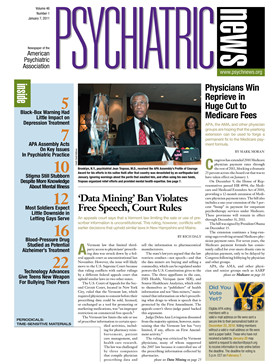In a president's column discussing the ABPN maintenance of certification (MOC) criteria, Dr. Bernstein states, “It is not as complicated or demanding as many of us think,” and “we must . . . not advocate for some type of special status different from the rest of medicine” (Psychiatric News, November 19, 2010). As the initiator of a referendum petition signed by 797 other APA members stating that some MOC requirements are unnecessary and burdensome, with potential to damage treatment, I would like to make the following comments.
Many of us are not against soliciting patient feedback in indicated situations. In fact, in psychotherapy we often pay attention to nonverbal signs from the patient and explore them to get meaningful information. What we are against is an external mandate that we collect evaluations by patients for maintaining our certification. We believe that such a mandate will damage the time-honored doctor-patient relationship. There is literature showing that if you introduce external rewards or regulators on acts that were formerly intrinsically driven (as the doctor-patient relationship should be), it can actually dampen the behavior. For example, people who are inclined to donate blood are less likely to do so if you add an external incentive. It changes how one views the act (Daniel H. Pink: Drive: The Surprising Truth About What Motivates Us. Penguin, 2009). We are not against patient feedback in residency training, where the patient knows that he or she is being treated by a trainee and where it could be one measure of assuring professional competence before one graduates.
Mandated patient feedback will damage the doctor-patient relationship in all branches of medicine. Thus, we are not advocating for a special status for psychiatry different from the rest of medicine. Patients may now think that their doctors are treating them nicely not because of their intrinsic worth or the doctor's helpful nature, but because the doctor has to comply with an external agency requiring it. There is potential for preferential treatment of a select few patients whose feedback the physician has decided to seek for his or her own benefit (maintenance of certification), distortion of transference, and an adverse influence on prescriptions, limit settings, and discharge plans.
While a chart review for comparing one's practice against guidelines has merit, requiring 10 chart reviews every three years is onerous, especially when it comes on top of 10 patient reviews and 10 peer reviews. Making too many demands on physicians' time can impair performance.
The peer evaluation is likely to become a meaningless exercise and can deteriorate to “You scratch my back—I scratch your back.” You would give a good evaluation for a peer so that that peer in turn would give a good evaluation for you. Psychiatrists in small settings may be reluctant to speak against efforts to grant psychologists prescribing privileges, or against allied health professionals acting beyond their scope of practice, or against substandard care or unprofessional behavior by others, because they are dependent on these others' evaluations for their own recertification.
RAMASWAMY VISWANATHAN, M.D., D.Sc. Brooklyn, N.Y.
